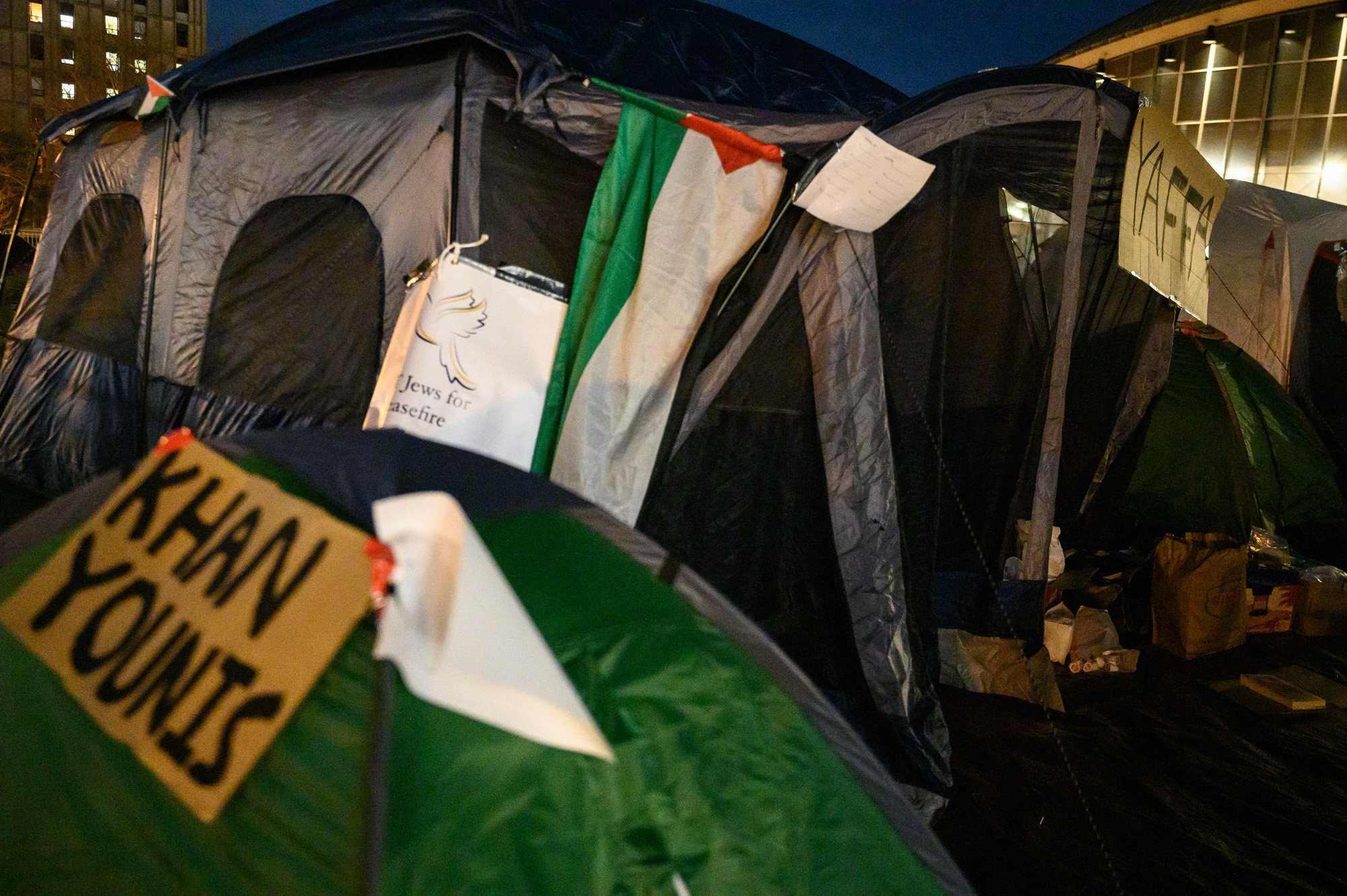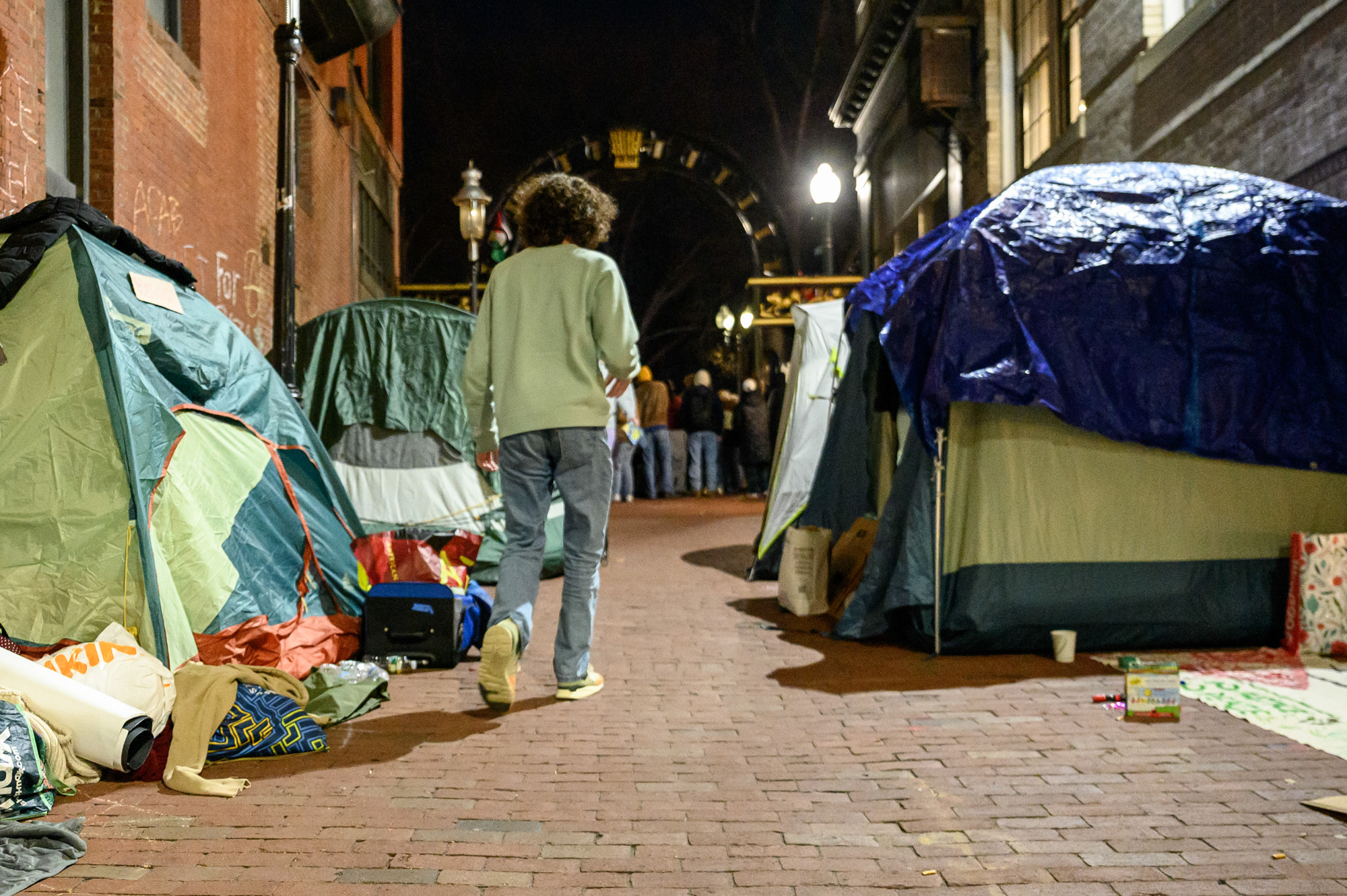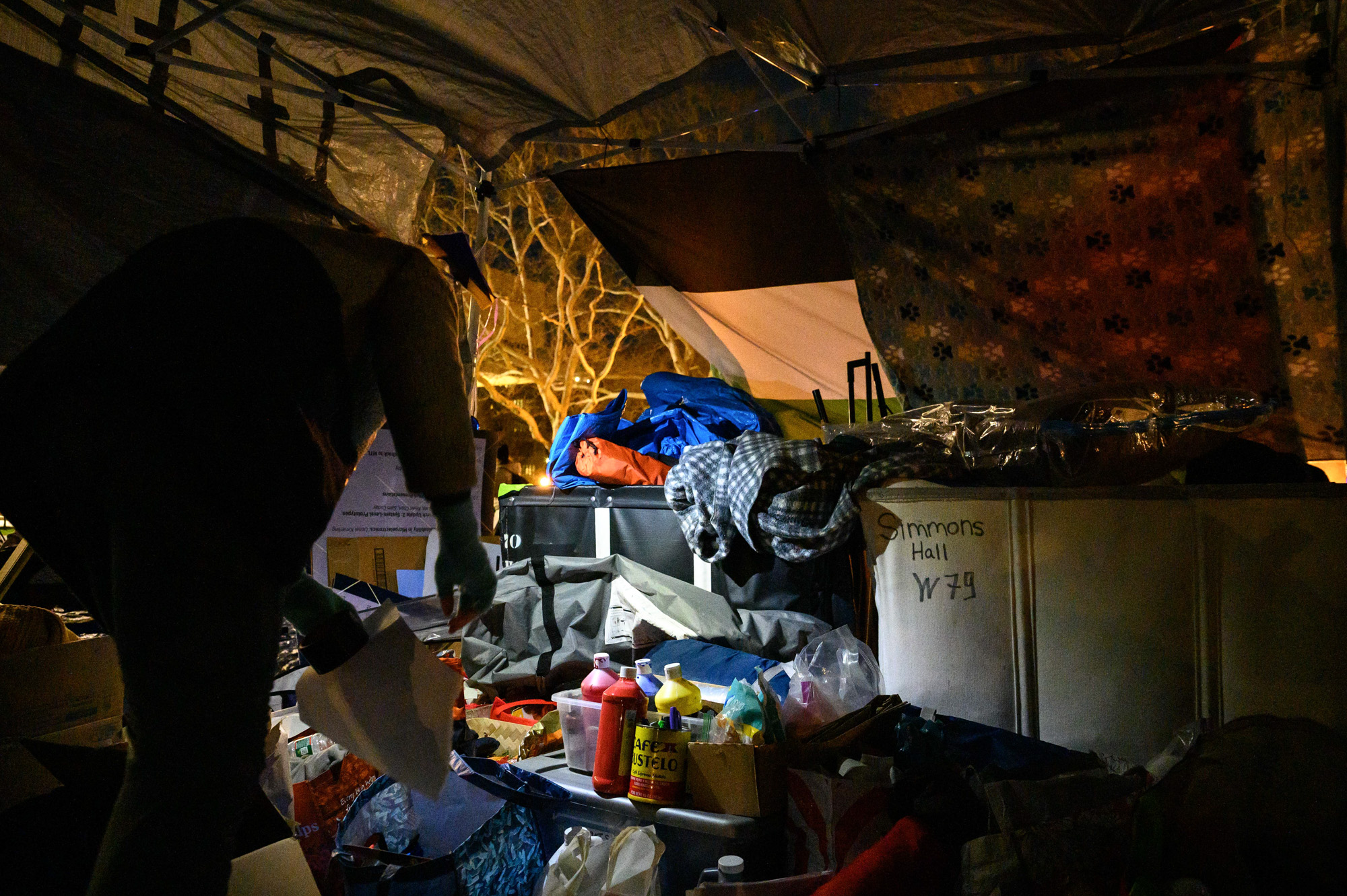The first day of Passover happened rather unceremoniously in the 2 Boylston St. alley. Grape juice and paper seder plates bordered a dinner table thrown together with copies of Emerson College’s student newspaper, sprawled long across the brick ground.
Reading from the Freedom for All Seder Haggadah, Amanda Bloom, an Emerson student, toasted to a “communal hope for a ceasefire.”
Across the bridge, a neat block of tents framed Massachusetts Institute of Technology’s Kresge lawn. Each tent was named with a cardboard sign: “Bethlehem,” “Deir Yassin,” “Yaffa,” “Khan Younis.” There were a dozen or so.

After more than 100 demonstrators at Columbia University were arrested during a pro-Palestinian encampment protest, Columbia students called for others to replicate the effort on their own campuses. Students at universities in Greater Boston listened — tents are now up at Emerson, MIT and Tufts.
Starting on Sunday evening, tents were pitched, blankets were laid out and Emerson students settled in for the night to join the encampment efforts. Sandwiched between Emerson’s student housing, dining hall and Mass. Transport, 2B alley is a nexus on an urban campus made up mostly of sidewalks.
“We’re dealing with themes of place and ownership,” said Jonah Hodari, a junior at Emerson. “As the students at this school who pay to go here, we are entitled to optimize the space and use it as we see fit.”
On Monday at noon, Hodari went to take a quick shower before returning to the encampment, where he had been since 6 p.m. the night before.
“I didn’t sleep, but many people did. I [had] so much energy that I just couldn’t really rest,” he said. “It was beautiful. We took shifts. We were having great conversations. My friends and I did meditations. We played games.”
Students and community members worked in shifts to maintain the operation amidst looming finals as the semester ends. Along the alley were various stations for crafts: pin-making, embroidering, sign-painting and a make-shift library. Card games were played in circles and the wellness table overflowed with food and supplies, all of which had been donated.
Sadia AboHussein, a senior at Emerson and an organizer of the camp, said operations on Monday were less stressful than the first night, since community efforts became “significantly more self-sustaining.”
“I have been, since yesterday, stressed out about how to organize and label all of the food,” AboHussein said. “I came out today, and someone [had] just organized and labeled all of [it].”
Emerson’s protest occurs amidst heightened tension with administration following 13 student arrests at a peaceful protest outside of the Emerson Cutler Majestic Theatre last month.
“We’ve been escalating our action against the administration … the time was just definitely right,” Bloom said. “Students have never been more mobilized on Emerson campus.”
Emerson’s chapter of Students for Justice in Palestine, along with supporting staff and faculty, had a Zoom meeting with newly inducted president Jay Bernhardt and other administration on Monday. Bernhardt “couldn’t commit to any of [SJP’s] demands,” AboHussein said.
AboHussein said the most frustrating part of these meetings is that she is less able to participate in “the most valuable” part of the protest — being at the encampment. She said administrators seem to take credit for the lack of arrests so far, while claiming not to have control over the BPD.
“For them, every meeting is just to check a box,” AboHussein said. “Just to say that they did it.”
SJP at Emerson has four demands for their administration: to call for an immediate ceasefire in Gaza, disclose all ties to Israeli and Zionist organizations, divest financially from these organizations and end suppression of student protesters.
Demands are generally standard across participating Greater Boston universities.

Hannah Didehbani, a student leader for the Coalition for Palestine at MIT, said their encampment calls itself “scientists against genocide,” and students’ first priority is to cut their university’s research ties with Israel.
“MIT is unique in that we are a tech school, and there are professors on this campus who directly get money from the Ministry of Defense of Israel to do research,” Didehbani said.
Graduate and undergraduate student bodies have passed resolutions calling for MIT to dissolve these research partnerships, Didehbani said.
“People make bombs here. People make technology that burns through the flesh and breaks bones and is intended to do that as efficiently as possible,” said a senior at MIT who wished to remain anonymous for fear of repercussions. “We’re calling on MIT to stop doing that and to develop science — that, I assume, is why everyone came to MIT, to make science — that works for people, not against them.”
Forty years ago, students built a “shantytown” on Kresge lawn to demand MIT’s divestment from South African apartheid. On Monday night, tents sat facing inward on Kresge, enveloping a circle of students in soft discussion about sleeplessness in Gaza.
The MIT student told the group about growing up in Jerusalem and how he has never been to Gaza. He noted how easy it is to move between “cities” within the encampment, when the reality in Gaza is much different.
“This does kind of feel reminiscent, somewhat, of a free Palestine,” they said.
Also in Cambridge, Harvard University suspended its Palestine Solidarity Committee and shut down Harvard Yard, prompting students to join protests at MIT. Over 45 protesters have been arrested at Yale. Police cleared New York University’s encampment and made over 100 arrests on Monday night. Columbia set a midnight deadline to clear the camp and threatened arrest.
As free speech contentions intertwine with Israel-Palestine demonstrations, students attempt to address administrative issues within their universities while centering the struggle in Gaza.
“I do feel like they’re really interconnected,” Bloom said. “All injustice is really tied to our rights as students and as citizens to protest and exert control over the institution that we paid so much money to.”
She said the primary purpose of the encampment at Emerson is the liberation of Palestine.
Austin Cole, a graduate student at MIT, said it would be a “mistake” for the encampments to be only seen as a college free speech issue.
“[The effort is] only as good as it actually brings attention to the genocide … and to the need to stop that genocide, to end the occupation and to have a liberated Palestine,” Cole said.

At 2B, four Emerson students sat in a circle, cross-legged, playing cards Monday night.
“[Community has] always been strong in the alley, but it’s even stronger now,” said one of the students. “I feel like I’m never going to walk through the alley again, not remembering what we’re doing.”
At Kresge, students readied to stay the night by reflecting on why they were there.
“I don’t think you can really be in solidarity with a people if you don’t, at least to some degree, feel what they’re feeling,” Cole said. “We’re sitting under a clear sky. We’re not worried about bombs dropping over our heads, but to really sit and think about what it means to be outside, to be under the same sky that folks in Gaza are under, I think is really important.”

























































































































Aimee • Apr 24, 2024 at 10:38 pm
A very authentic and captivating series of events conveyed through powerful words, a strong depiction of emotions feeding into the events .
Roy Jad • Apr 24, 2024 at 2:35 am
Incredible storytelling ?